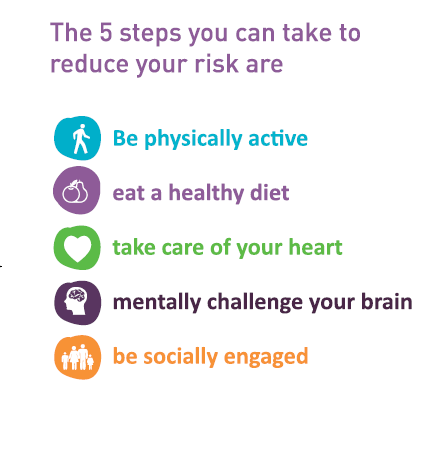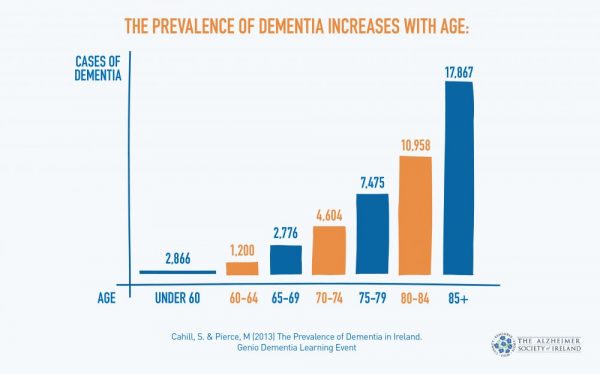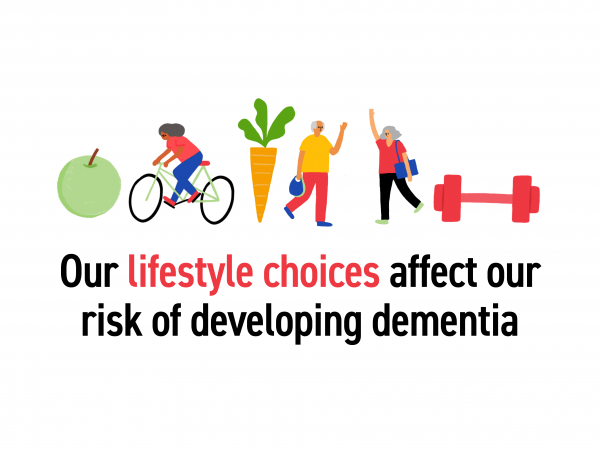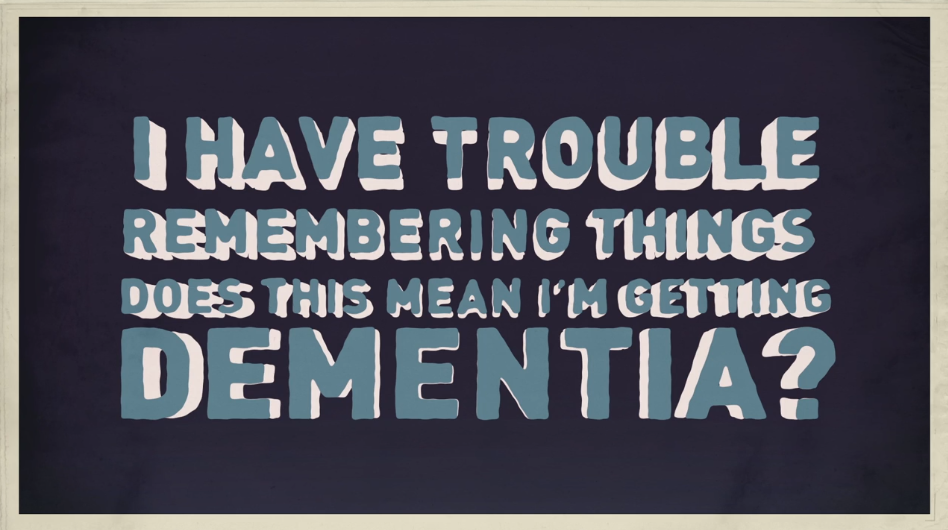Brain Health
You cannot cure Alzheimer’s disease but growing scientific evidence indicates that by keeping your brain, your body and your heart healthy you can reduce your risk of developing it and other types of dementia.
Think of 5 steps you can take to reduce your risk
Include them into your daily routine, remind yourself to perform one task in each key area.

Be physically active
Doing at least 30 minutes of moderate intensity aerobic physical activity 3- 5 days a week such as:
– Walking, cycling, swimming, dancing or an exercise class;
– Gardening, washing the car, cleaning the windows;
– Take the stairs instead of the lift or go for a walk at lunch;
– Build it up over time and if you have any doubts talk to your doctor.
Please note: Build it up over time and if you have any doubts, talk to your doctor.
For suggestions and practical tips to help get you active visit www.getirelandactive.ie
Take care of your heart
What is good for your heart is also good for your brain. Protect yourself from things that can damage your heart and your brain such as:
– Have regular health checks with your doctor to ensure your blood pressure, cholesterol and blood sugar levels are at a healthy range;
– If you smoke, try to give them up, it’s never too late;
– Drink alcohol in moderation;
– Take steps to maintain a healthy body weight.
For information and practical suggestions to help you manage cholesterol, your blood pressure and how to keep your heart healthy, speak with your doctor and visit www.irishheart.ie
For help to give up smoking speak with your doctor and visit www.quit.ie or call 1850 201 203
Eat a healthy diet
Eat a healthy balanced diet for brain and heart health.
– Eat plenty of fruit and vegetables, 5 servings a day
– Include fish in your diet, particularly oily fish such as salmon, mackerel or sardines
– Cut down on salt intake
– Reduce fat, saturated fat and sugar in the diet
For information about healthy eating and recipe suggestions visit www.safefood.eu
Take part in social activities
Connecting and interacting with social activities helps to build strong connections in the brain.
– Phone or meet family and friends regularly, share news and keep in touch
– Join a group such as a walking club, book club or sporting club
– Go to the theatre, museum, the cinema or to a concert with a friend
– Volunteer with a favourite charity or local community group
Challenge your brain
Train your brain with new activities to help build new brain cells and strengthen connections between them.
– Take up a hobby such as painting, woodwork or craft work
– Read different styles of books, newspapers and magazines
– Learn a language, an instrument or to dance
– Play board games or cards with a club or with friends
Your local newspaper and radio stations are often a great source of information about clubs, groups and social activities taking place in your area.
For puzzles and brain games visit https://www.understandtogether.ie/about-dementia/puzzles/
Resources:
Click below to view and download our resource on Brain Health
- Brain Health leaflet
- Watch Hello Brain video’s by clicking here
- For information on the Healthy Ireland Campaign, click here
The research
Growing scientific evidence indicates that lifestyle and health choices can help to keep our brain healthy and reduce our risk of developing dementia in later life.
Lowering our risk does not mean we can definitely avoid dementia.
Dementia cannot yet be prevented our cured. But evidence does suggest that by making small changes to the way we live, we can reduce our chances of developing dementia or at the very least, improve our health and well-being.
For more information about the scientific evidence visit:
Risk Factors
A risk factor is something that can affect your chance of getting a disease such as dementia. There are some risk factors we cannot control include our age and genetics and there are other risk factors we can change including our diet and increasing how much exercise we do daily.
It is important to remember that having a risk factors linked with dementia does not mean a person will necessarily develop dementia in the future. Likewise, avoiding risk factors does not guarantee that a person will stay healthy, but it does make this more likely.
The most important thing is not to worry alone, if you have concerns talk to your doctor or call the Alzheimer National Helpline on 1800 341 341.
Risk factors we cannot change which are linked with dementia include:
Age

Age is the most significant risk factor for developing dementia. Dementia can occur at any age, but is not as common in people under 60 and becomes more common as we age. Dementia affects 1 person in 7 aged 65 to 70 years and this rises to 1 person in 5 over 80 years.
While it is known that age is a risk factor, developing dementia is not an inevitable part of ageing. Many people do not develop dementia at any age.
Genetics
You may be concerned that you can get a form of dementia if you have a family member who has a type of dementia or if you can pass on the type of dementia to your children. However the majority of dementia’s are not inherited – which means the gene being passed down from generation to generation, it depends very much on the particular cause of dementia.
The role of genetics in the development of dementia is not yet fully understood. There has been some progress in this area and certain genes have been identified as playing a part in the development of different types of dementia.
A gene called apolipoprotein E (ApoE) has been linked to Alzheimer’s and vascular dementia, however the role it plays is not yet fully understood. People with this gene have not developed dementia and people who do not have it, have developed the condition. Even where this gene is present, there is only a slightly increased risk of developing the condition than the average population.
There are some rare forms of dementia that can be passed from generation to generation. It is important to know that these genetic factors only cause the condition in a very small number of families. One such form is Familial Alzheimer’s. This very rare form of dementia affects younger people and can result in people in their 30’s and 40’s developing the condition. Where Familial Alzheimer’s is present, there is a 50% possibility of passing on the gene to the next generation who would then eventually develop the condition.
It is important to remember that early onset Alzheimer’s – that is where the condition develops in people under 65 – is rare and not all of these cases are thought to be inherited.
Some forms of frontal-temporal dementia or Picks condition have a strong family history and in some cases a genetic link has been found. These inherited types of dementia are rare.
Family History
If you have a family history of these rare types of dementia you can talk to your doctor about genetic counselling and if it is appropriate for you. Genetic counselling is a process which will help to determine if your family history suggests genetic testing is an option to be considered and if it is right for you.
Specific medical conditions can increase a person’s chances of developing dementia. These include Huntington’s disease, Down syndrome and HIV.
A person’s risk of developing vascular dementia is affected by mid-life high blood pressure, high blood cholesterol levels, stroke, diabetes and heart problems.
Risk factors we can change which are associated with dementia include:
Lifestyle

There is increasing evidence that our lifestyle can impact our chances of developing dementia.
Thankfully we can make changes to our lifestyle and so reduce our risk. The areas that can impact our risk of developing dementia also impact our risk of developing many types of illness. These include:
Diet and nutrition
A poor, high fat diet contributes to a high body weight, heart disease, high blood pressure and poor cholesterol levels – all risk factors in developing dementia.
Smoking
Has an extremely harmful effect on the heart, lungs and vascular system. Smoking is a significant risk factor in developing a range of illnesses including dementia. You will always benefit from giving up smoking.
Alcohol
Excessive alcohol over a long period of time can increase a person’s risk of developing a form of dementia called Korsakoff’s syndrome. However, there is some research that suggests a moderate amount of red wine (which contains antioxidants) might help to reduce our risk of dementia.
Lack of Physical Activity
Can lead to problems with body weight and to problems with our hearts and vascular system – these problems can in turn increase our risk of developing vascular dementia.
For further information:
- Talk to your GP
- Call the National Helpline on 1800 341 341
- Read our Brain Health resources
- Watch Hello Brain videos by clicking here
- For information on the Healthy Ireland campaign, click here


